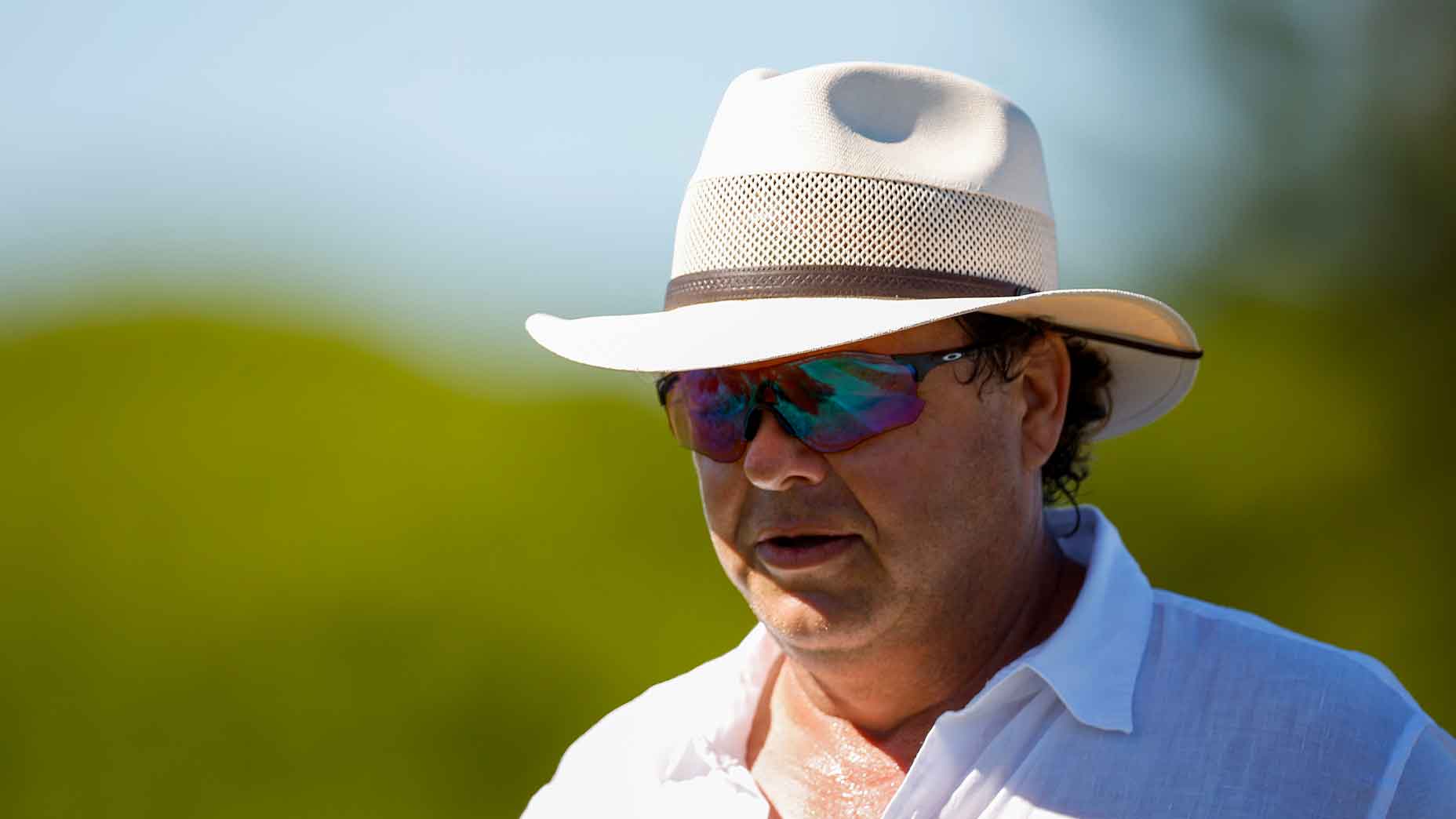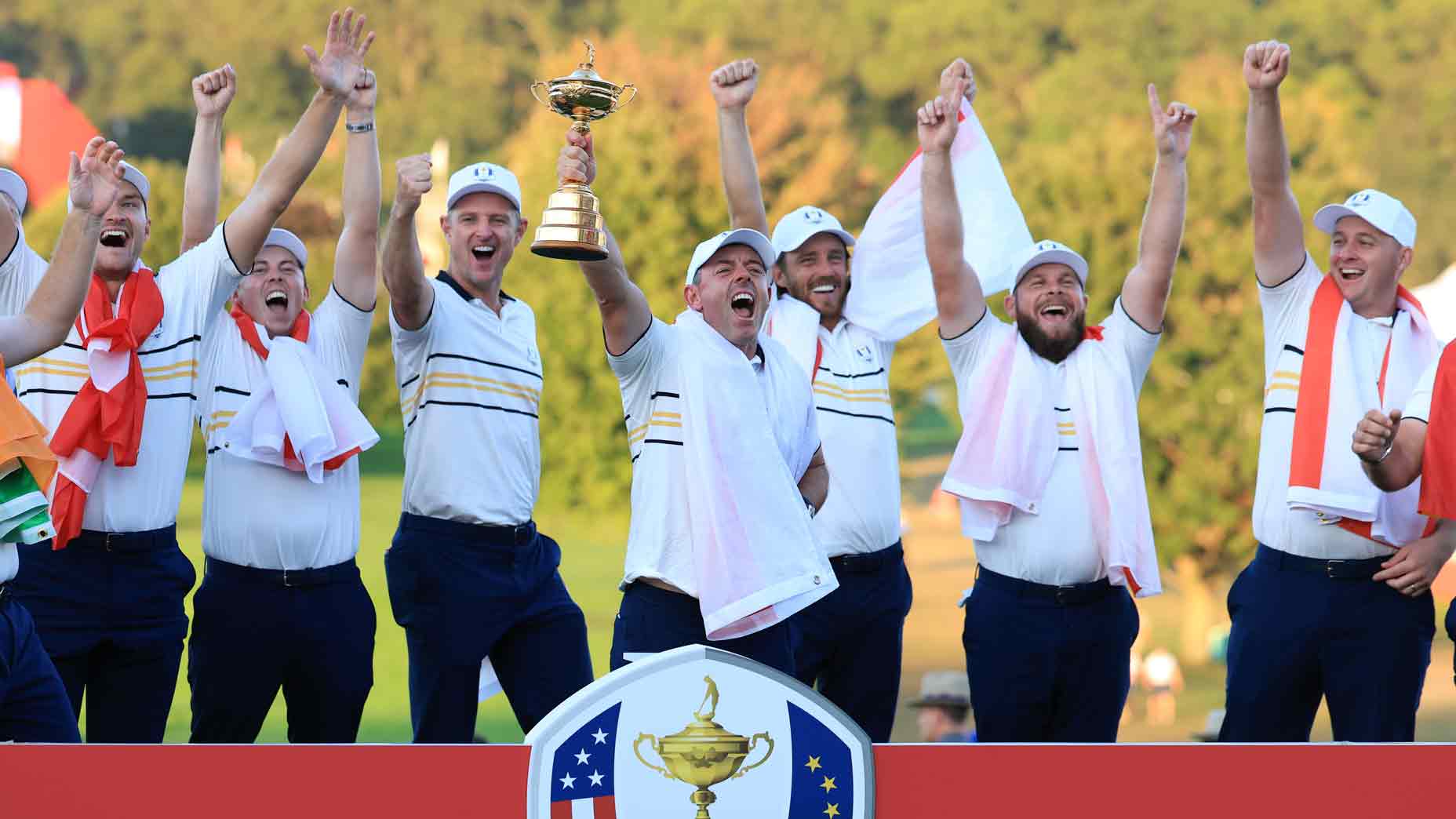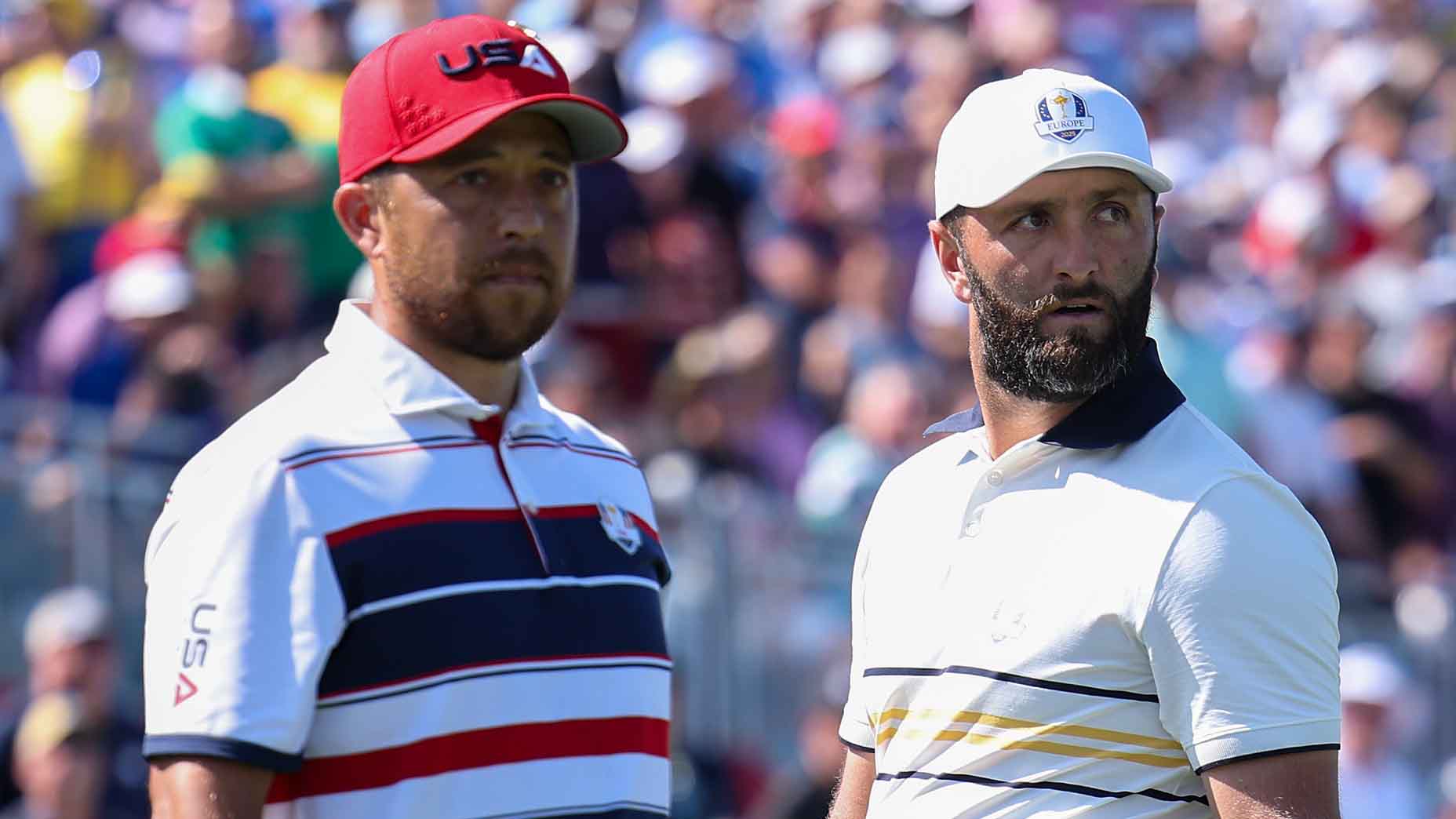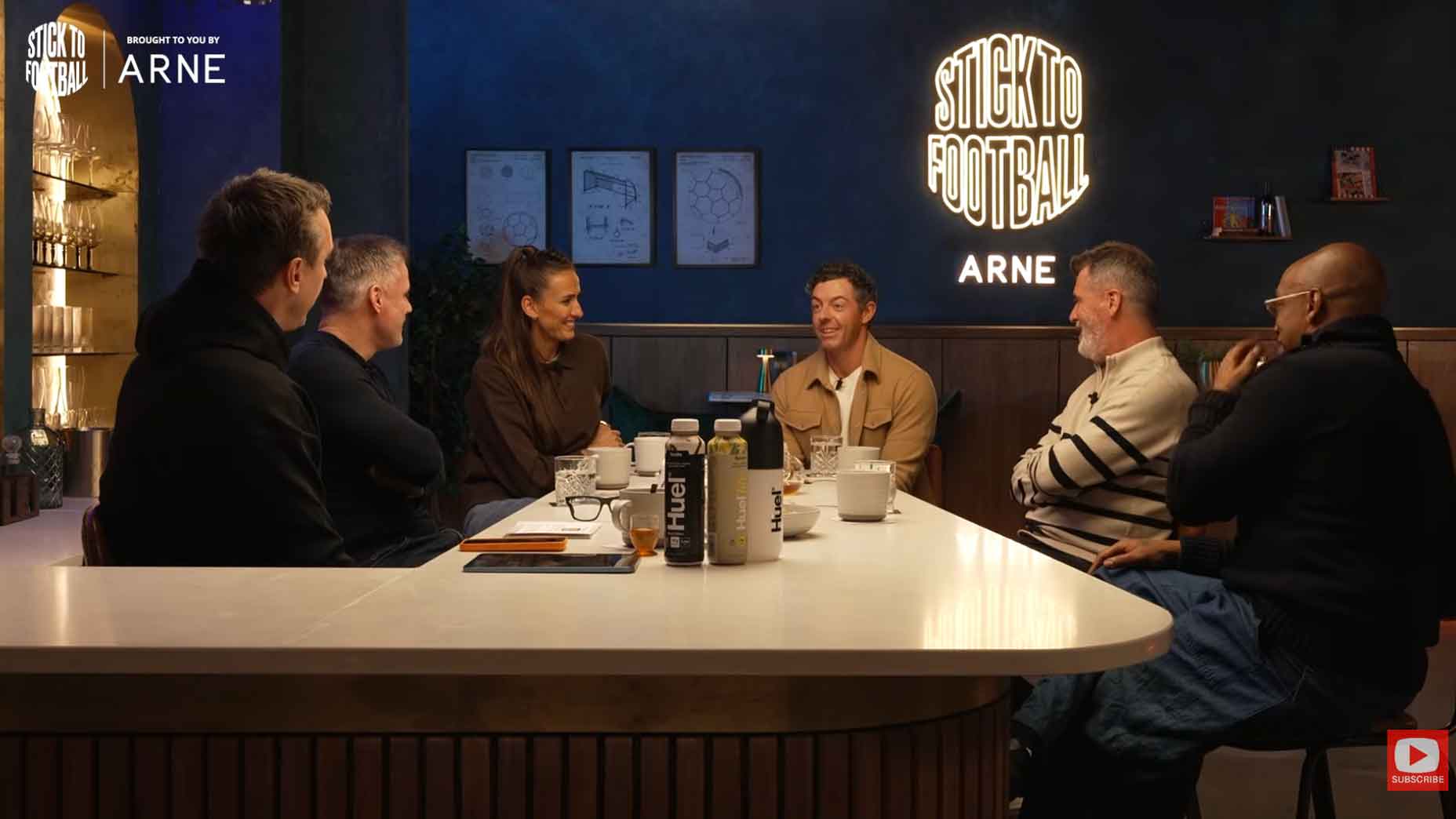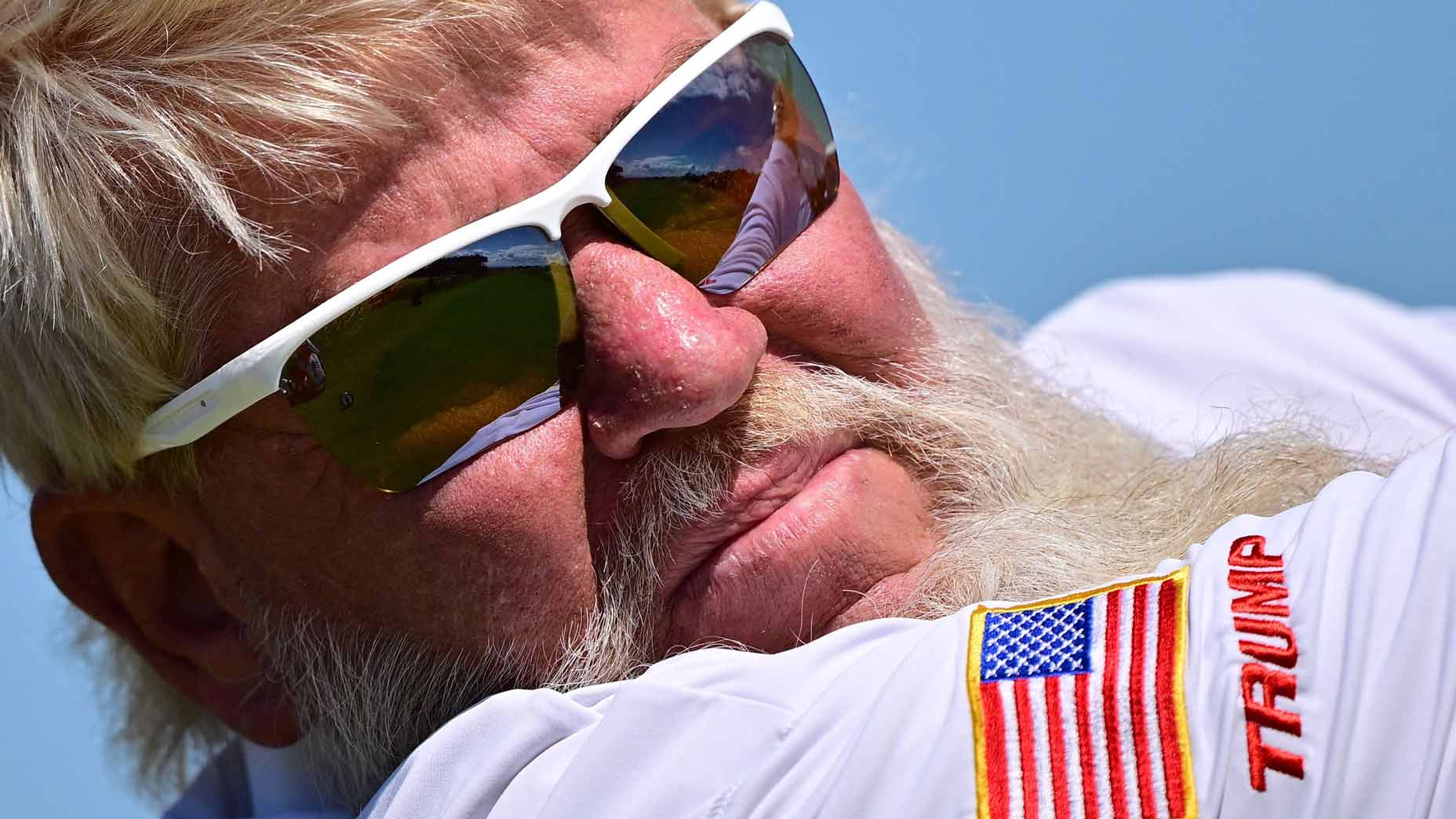ROME — As members of the U.S. Ryder Cup team faced questions from the assembled media on Sunday night, one hot-button question still hadn’t been fully answered:
What’s up with Patrick Cantlay’s hat?
It’d been a topic of conversation (plus songs, cheers and confrontations) since a report emerged Saturday connecting Cantlay’s caplessness to a movement for Ryder Cuppers to get paid. Cantlay had denied that he was making any sort of statement — “it just doesn’t fit,” he’d said — but it’d become a rallying cry for each side. Yeah, I know how strange that sounds. But it’s how we arrived at the point in the post-Cup presser that a reporter posed the latest hat conspiracy.
Cantlay was getting married on Monday, he’d heard, the day after the Cup’s conclusion. Had he stayed hatless to avoid an embarrassing tan line on his wedding day?
Cantlay grinned.
“Did you read that on Twitter?” The U.S. team cracked up. “Yeah, you did!”
But the reporter clarified his source. The tan-line theory had come, in fact, from Stefan Schauffele, who’d espoused it on a German radio show earlier on Sunday. Stefan is the father to Xander, Cantlay’s frequent Ryder Cup partner and closest friend on Tour.
Xander, who was sitting next to Cantlay, leaned forward into his microphone.
“I apologize for anything my father said,” he said.
The room burst into laughter.
AS IT TURNS OUT, Stefan Schauffele had been saying quite a bit.
It had been a charged 24 hours at the Ryder Cup. The report about the hat also included allegations of a rift in the locker room, and Stefan took those allegations personally. He felt the report was unfair and led to unsporting treatment from the European fans. Now he wanted to voice his own feelings on the matter.
Shortly before Xander’s singles match teed off, two other writers and I came across him near the practice green, where players finished preparations for the final few matches of the day. Stefan is easy to spot; the towering man known as “Ogre” can generally be found wearing a fedora, a linen shirt and a mischievous grin. He is his son’s swing coach and helps handle his business affairs — plus he’s never short on opinions. We were eager to get his take on the previous day’s events, given his son’s proximity to the report and to Cantlay. Stefan was eager to chat, too: he suggested we start recording.
The idea that players should get paid, he said, is “absolutely noncontroversial.”
Fans had focused their attention from the previous day’s report on hard-to-verify little details — Was the hat a specific point of protest? Had Cantlay and Schauffele been sitting in a different corner of the locker room? Did Cantlay attend the team’s gala dinner? — but the larger point stood unresolved. Had Cantlay been lobbying for player pay? Had others, too? Biggest of all, should players be paid?
After Saturday’s round, a reporter asked Cantlay that question directly. He’d declined to answer. “It’s not about that,” he said. “It’s just about Team USA and representing our country.” The subtext was clear: this wasn’t the time nor the place. “That’s all I’ve got to say about that,” he concluded.
But if Cantlay’s approach was to handle matters behind closed doors, Stefan (who we’ll reference by first name here, just for clarity) favored the opposite.
“I think if the PGA of America is a for-profit organization, they need to have the players share in that profit,” he said. “Instead of being so damn intransparent about it, they should reveal the numbers. And then we should we should go to the table and talk.”
As things currently stand, the governing bodies behind the Ryder Cup are not “for-profit” organizations. The PGA of America operates under the same 501(c)(6) status as the PGA Tour, while the DP World Tour is a “benevolent trust,” meaning both organizations are legally considered non-profits. A stipulation of that tax status requires all revenues generated by organizations to be redistributed to the organization’s members, which includes those 24 Ryder Cuppers. It is this same tax status that allows the PGA Tour to pay its players considerable sums while operating under the “non-profit” umbrella.
The story behind Patrick Cantlay, ‘HatGate’ and a Ryder Cup gone madBy: Dylan Dethier
Similarly, the Ryder Cup generates hundreds of millions of dollars for the organizations behind it. The question here is about how those funds are being used. PGA of America head Seth Waugh told the AP that his organization operates “on a break-even basis” over a four-year Ryder Cup cycle and that the Cup helps fund its programs for PGA professionals and others. Presently, a negligible amount of the Cup’s total proceeds go toward player compensation. Is that the best use of the money?
“It’s not,” Schauffele said.
In exchange for playing in the event, Ryder Cuppers are given charitable donations of $200,000 each, and they’re able to direct that money to causes they see fit. The PGA Tour also receives 20 percent of Ryder Cup TV profits from the PGA of America; that money is distributed to the Tour’s pension plan but not specifically to the Ryder Cuppers themselves. That’s not enough, Stefan argued.
“Alternatively, they can donate all proceeds after opening the books to a charity of our joint choice, and then we will happily play for free,” Stefan added. “Please print that.”
IN HIS MIND, it’s a simple argument, Stefan explained. And it’s been made before.
“In the past we had a couple of revolutions starting with Mark O’Meara and Tiger and Duval — and Brooks, last time, when he said ‘why should I go play?’”
His historical references check out. The first significant movement for player pay at the Ryder Cup happened a quarter-century ago, when Tiger Woods deemed the lack of player compensation “completely unfair” and David Duval threatened to skip future Cups. He said others, including Woods, were considering it too. That was the impetus for the charitable donation.
As recently as 2020, Koepka suggested he might skip the Ryder Cup if it was held without fans, suggesting that the PGA of America’s desire to make money off of the event would be the “only reason” it would go ahead.
“As players, I think we all know why they’re playing or why we would play,” Koepka said at the time.
Stefan believes he has logic on his side. “It’s a pretty simple kind of argument,” he said. “I think it would stand up in anybody’s mind, the court of public opinion and potentially in the courts.”
The last bit was particularly foreboding.
THIS IS A TOUGH WAR to wage in public. Stefan acknowledges that.
“I understand both sides, of course,” he said.
Demands for Ryder Cup payment run the risk of sounding tone-deaf, particularly these days, when the unprecedented amount of money in professional golf meant all but one of the 24 players in attendance had cleared well into seven figures for the season by the time they landed in Rome. (Ludvig Aberg, who only turned pro halfway through the 2023 season, is the lone exception.)
From a fan’s perspective, there’s something refreshing and pure about the Ryder Cuppers showing up for free. Even the captains themselves seemed against the idea.
“Absolutely not,” European captain Luke Donald said when asked on Saturday night if players should be paid. “[It’s] what the Ryder Cup represents. It represents true sport. You saw it with some of the passion at the end there [with McIlroy and Joe LaCava]. It’s a passionate event. It’s about pride. It’s about representing your country. It’s about coming together as a team. It’s the purest form of competition we have, and I think because of that, the fans love it. There’s no extrinsic motivation involved. It’s purely, purely sport. That’s what makes it so special.”
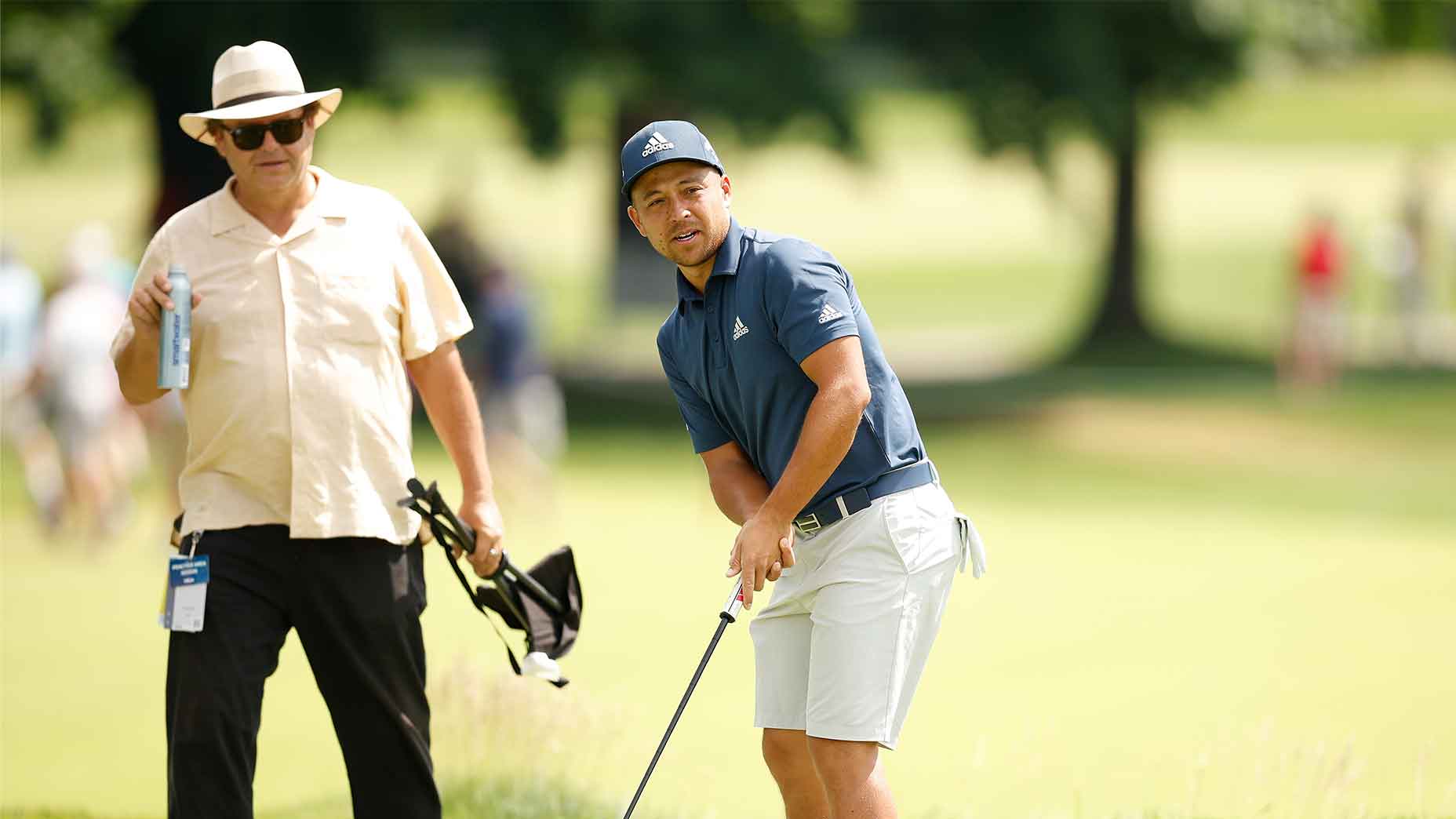
Johnson added that the competition is “about more than any of that” at the Ryder Cup. “It’s about standing with a band of guys to represent your nation, to represent more than you in the game of golf. It’s a sport for one week. And you know what? I would say if there’s anything that deals with money, there’s guys that would pay to play in this.”
But Stefan argues critics of the Cup are conflating exploitation with nationalism.
“We need to talk about it without [players] getting shamed into not being patriotic,” he said. “If there is any portion of this that is unpatriotic, it’s the PGA of America that are unpatriotic.”
Given Stefan’s critique, there’s some irony to the fact that the biggest win of Xander’s professional career came in the Olympic golf competition — a tournament where players are not paid for their attendance, and medal-winners receive only a pittance of the billions the Games generate worldwide. The Games, like the Ryder Cup, have traditionally not been viewed as a commercial endeavor for the athletes participating in them. The International Olympic Committee, another non-profit organization, says it uses the billions the Games generate to “assist athletes and develop sport worldwide.”
That’s a similar argument to the one used by the PGA of America and DP World Tour, the two governing bodies responsible for the Ryder Cup, though Stefan remains dubious about the way the governing bodies are using those funds.
“If they make profit off this and finance their organization of almost 29,000 [PGA of America] members for four years with the proceeds earned on the backs of these guys here, well, then they should share or they shouldn’t be allowed to do that,” Stefan said.
As our conversation drew to a close, I wondered if he worried about his comments bringing heat to Xander. He said he didn’t think so; he speaks only for himself.
“There’s my own word and Xander has his own word, how’s that? In a month he turns 30. He’s a full-grown man. What his father says no longer reflects.”
Ryder Cup Sunday wasn’t the first time Stefan voiced his opinions nor the first time he’s challenged golf’s institutions. Heck, it wasn’t even the first time that morning. In a different conversation with the Times UK, he suggested that Xander had been “strong-armed” into signing a player participation agreement that included Netflix having access to the U.S. team room for the filming of its Full Swing docuseries. While the series wouldn’t have been able to show players in the locker room who hadn’t agreed to be in the show, Xander’s hesitancy to sign it had a cascading effect: the U.S. team eventually decided the simplest path forward was to keep cameras out.
Netflix had full access, meanwhile, to the team room for the winning European side.
“Apart from the fact the guys don’t get paid, you cannot make a deal with a third party that we are not party to for rights into eternity,” Stefan told the AP last month.
As for what happens next?
“Like with other things that I’ve tried to improve, it’s all about making a better product, right? That’s truly what it’s about,” he said. “I know this is not going to happen this time. This may not happen next time, but I think it’s a process and somebody has to start somewhere. And so I’m willing to take the heat and hopefully when I’m done walking around out here, then maybe this comes to fruition.
“It’s a long-term play, right?”
